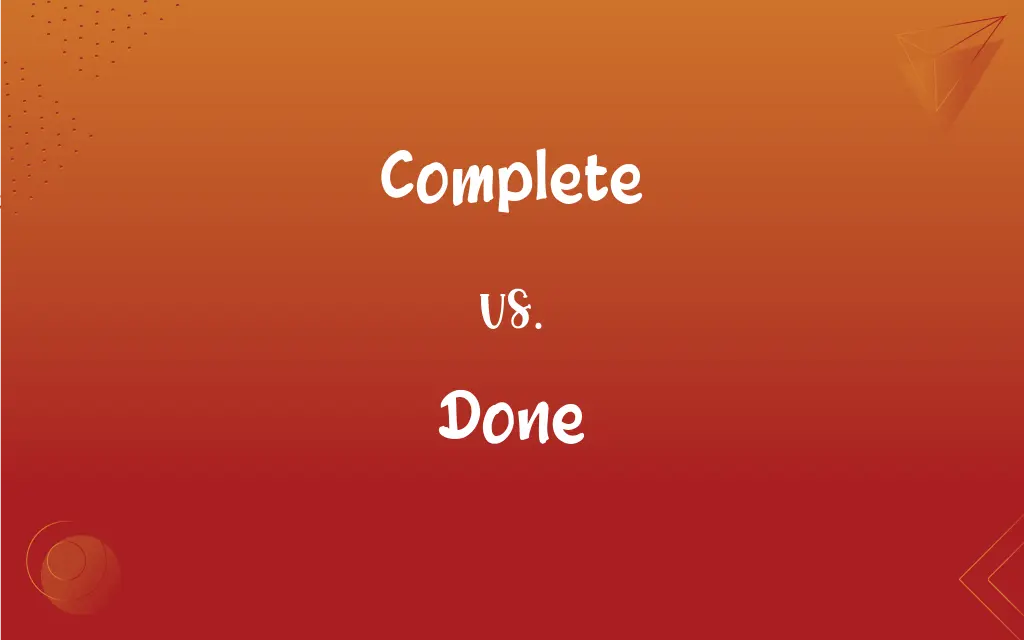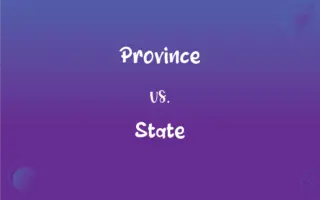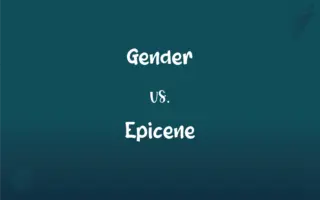Complete vs. Done: What's the Difference?
Edited by Harlon Moss || By Janet White || Updated on September 27, 2023
“Complete” refers to having all necessary parts, elements, or steps, while “Done” is used when an activity is finished or a task is accomplished.

Key Differences
“Complete” and “Done” are words that denote the finishing of an activity or task. “Complete” is used more to describe when all the parts, elements, or steps that are necessary to finish a task are present or have been performed. It is often associated with the completeness or wholeness of a task or object, where every component or aspect is accounted for. “Done”, on the other hand, is a straightforward term used to state that an activity or task is finished or accomplished, irrespective of the parts or elements involved.
The context of “Complete” often revolves around the integrity of a task, referring to a state where nothing is missing or lacking. It implies the comprehensive fulfillment of prerequisites or criteria. “Done” is usually used in more casual contexts and indicates the conclusion or the ending of an activity. It is less about the wholeness or the integrity of the task and more about its conclusion, focusing primarily on the cessation of action or process.
The grammatical role of “Complete” is versatile; it can function as a verb, adjective, or transitive verb, allowing it to adapt to different sentence structures. It can denote either the action of completing something or the state of being complete. “Done”, predominantly an adjective but also used as a verb, is more concentrated on indicating the finishing or the finalizing of an action, often not emphasizing the constituents or the internal completeness of the task or object.
The usage of “Complete” is more formal, often found in academic writings, official documents, and professional settings. It is meticulous and denotes precision, illustrating that every single piece or part is in place. “Done” is a common, everyday term, used widely in informal speech and writing, delivering the message of completion in a more general, colloquial manner, without delving into the intricate details or elements of the task or object.
Comparison Chart
Definition
Having all necessary parts, elements, or steps.
Finished or accomplished.
ADVERTISEMENT
Context
More about integrity and wholeness of a task or object.
More about the conclusion or the ending of an activity.
Grammatical Role
Can be a verb, adjective, or transitive verb.
Predominantly an adjective but also used as a verb.
Formality
More formal and denotes precision.
Common and informal, used in everyday language.
Focus
On the wholeness or the integrity of the task.
On the cessation of action or process.
Complete and Done Definitions
Complete
Having all the necessary parts, elements, or steps.
The puzzle is complete when every piece is in place.
ADVERTISEMENT
Done
Agreed; resolved.
It’s a done deal.
Complete
Fully accomplished.
The building is now complete and ready for use.
Done
In a state of having completed.
I am done with my homework.
Complete
Absolute; utter.
It was a complete surprise when he arrived unannounced.
Done
Past participle of do1.
Complete
Having all necessary or normal parts, components, or steps; entire
A complete medical history.
A complete set of dishes.
Done
Having been carried out or accomplished; finished
A done deed.
Complete
(Botany) Having all principal parts, namely, the sepals, petals, stamens, and pistil or pistils. Used of a flower.
Done
Cooked adequately.
Complete
Having come to an end; concluded
The renovation of the kitchen is complete.
Done
Socially acceptable
Spitting on the street is just not done in polite society.
Complete
Absolute; thorough
Complete control.
A complete mystery.
Done
(Informal) Totally worn out; exhausted.
Complete
Accomplished; consummate
A complete musician.
Done
Having completed or finished an activity.
He pushed his empty plate away, sighed and pronounced "I am done."
They were done playing and were picking up the toys when he arrived.
Complete
(Football) Caught in bounds by a receiver
A complete pass.
Done
(of an activity or task) Completed or finished.
I'll text you when the movie's done.
Complete
To bring to a finish or an end
She has completed her studies.
Done
(of food) Ready, fully cooked.
As soon as the potatoes are done we can sit down and eat.
Complete
To make whole, with all necessary elements or parts
A second child would complete their family. Fill in the blanks to complete the form.
Done
Being exhausted or fully spent.
When the water is done we will only be able to go on for a few days.
Complete
(Football) To throw (a forward pass) that is caught in bounds by a receiver.
Done
Without hope or prospect of completion or success.
He is done, after three falls there is no chance he will be able to finish.
Complete
(ambitransitive) To finish; to make done; to reach the end.
He completed the assignment on time.
Done
Fashionable, socially acceptable, tasteful.
I can't believe he just walked up and spoke to her like that, those kind of things just aren't done!
What is the done thing these days? I can't keep up!
Complete
(transitive) To make whole or entire.
The last chapter completes the book nicely.
Done
Inflection of do
I have done my work.
Complete
(poker) To call from the small blind in an unraised pot.
Done
; did.
Complete
With all parts included; with nothing missing; full.
My life will be complete once I buy this new television.
She offered me complete control of the project.
After she found the rook, the chess set was complete.
Done
Used in forming the perfective aspect; have.
I woke up and found out she done left.
Complete
Finished; ended; concluded; completed.
When your homework is complete, you can go and play with Martin.
Done
(obsolete) do
Complete
Generic intensifier.
He is a complete bastard!
It was a complete shock when he turned up on my doorstep.
Our vacation was a complete disaster.
Done
(slang) methadone
On the done
Complete
In which every Cauchy sequence converges to a point within the space.
Done
It is done or agreed; let it be a match or bargain; - used elliptically.
Complete
In which every set with a lower bound has a greatest lower bound.
Done
Given; executed; issued; made public; - used chiefly in the clause giving the date of a proclamation or public act.
Complete
In which all small limits exist.
Done
Having finished or arrived at completion;
Certain to make history before he's done
It's a done deed
After the treatment, the patient is through except for follow-up
Almost through with his studies
Complete
In which every semantically valid well-formed formula is provable.
Done
Cooked until ready to serve
Complete
That is in a given complexity class and is such that every other problem in the class can be reduced to it (usually in polynomial time or logarithmic space).
Done
Finished; concluded.
The baking is done when the cake is golden brown.
Complete
Filled up; with no part or element lacking; free from deficiency; entire; perfect; consummate.
Ye are complete in him.
That thou, dead corse, again in complete steelRevisit'st thus the glimpses of the moon.
Done
Executed; carried out.
Once the payment is done, the product will be shipped.
Complete
Finished; ended; concluded; completed; as, the edifice is complete.
This course of vanity almost complete.
Done
Cooked sufficiently.
The steak is done just the way I like it.
Complete
Having all the parts or organs which belong to it or to the typical form; having calyx, corolla, stamens, and pistil.
Complete
To bring to a state in which there is no deficiency; to perfect; to consummate; to accomplish; to fulfill; to finish; as, to complete a task, or a poem; to complete a course of education.
Bred only and completed to the tasteOf lustful appetence.
And, to complete her bliss, a fool for mate.
Complete
Come or bring to a finish or an end;
He finished the dishes
She completed the requirements for her Master's Degree
The fastest runner finished the race in just over 2 hours; others finished in over 4 hours
Complete
Bring to a whole, with all the necessary parts or elements;
A child would complete the family
Complete
Complete or carry out;
Discharge one's duties
Complete
Complete a pass
Complete
Write all the required information onto a form;
Fill out this questionnaire, please!
Make out a form
Complete
Having every necessary or normal part or component or step;
A complete meal
A complete wardrobe
A complete set pf the Britannica
A complete set of china
A complete defeat
A complete accounting
An incomplete flower
Complete
Perfect and complete in every respect; having all necessary qualities;
A complete gentleman
Consummate happiness
A consummate performance
Complete
Having all four whorls or principal parts--sepals and petals and stamens and carpels (or pistils);
Complete flowers
Complete
Highly skilled;
An accomplished pianist
A complete musician
Complete
Without qualification; used informally as (often pejorative) intensifiers;
An arrant fool
A complete coward
A consummate fool
A double-dyed villain
Gross negligence
A perfect idiot
Pure folly
What a sodding mess
Stark staring mad
A thoroughgoing villain
Utter nonsense
Complete
Having come or been brought to a conclusion;
The harvesting was complete
The affair is over, ended, finished
The abruptly terminated interview
Complete
To finish making or doing.
I will complete the assignment before the deadline.
Complete
To bring to an end; finish.
He completed his degree in two years.
FAQs
Are both “Complete” and “Done” used to denote the finishing of a task?
Yes, both “Complete” and “Done” denote the finishing of a task
Does “Complete” focus more on the integrity of a task?
Yes, “Complete” often implies the integrity and wholeness of a task.
Is “Done” more about the conclusion of an activity?
Yes, “Done” primarily indicates the conclusion or ending of an activity
Is “Done” predominantly used as an adjective?
Yes, “Done” is predominantly used as an adjective.
Is “Done” used in everyday informal language?
Yes, “Done” is a common term used in everyday informal language.
Is “Done” used to denote that cooking is finished?
Yes, “Done” can be used to denote that food is cooked sufficiently.
Does “Complete” imply that nothing is missing or lacking?
Yes, “Complete” implies that nothing is missing or lacking in a task or object.
Can “Complete” function as a verb and adjective?
Yes, “Complete” can function as both a verb and an adjective.
Does “Complete” appear in more formal contexts like academic writings?
Yes, “Complete” often appears in more formal contexts, including academic writings.
Is “Complete” more formal than “Done”?
Yes, “Complete” is generally more formal and precise compared to “Done.”
Can “Complete” be used to describe absolute or utter situations?
Yes, “Complete” can be used to describe absolute or utter situations, as in "complete surprise."
Can “Done” refer to an agreed or resolved state?
Yes, “Done” can refer to an agreed or resolved state, as in "a done deal."
Does “Complete” have various grammatical roles in sentences?
Yes, “Complete” has versatile grammatical roles, allowing it to adapt to different sentence structures.
Is “Done” simple and fundamental in learning English?
Yes, “Done” is fundamental and is usually one of the first words taught when learning English.
Can “Done” be used casually to convey completion?
Yes, “Done” is often used casually to convey the general sense of completion.
About Author
Written by
Janet WhiteJanet White has been an esteemed writer and blogger for Difference Wiki. Holding a Master's degree in Science and Medical Journalism from the prestigious Boston University, she has consistently demonstrated her expertise and passion for her field. When she's not immersed in her work, Janet relishes her time exercising, delving into a good book, and cherishing moments with friends and family.
Edited by
Harlon MossHarlon is a seasoned quality moderator and accomplished content writer for Difference Wiki. An alumnus of the prestigious University of California, he earned his degree in Computer Science. Leveraging his academic background, Harlon brings a meticulous and informed perspective to his work, ensuring content accuracy and excellence.































































